实用英语 第一册 上海交通大学出版社B 1 U 4
实用英语第一册第八单元课件

They boasted that they can speak six languages fluently. He didn’t talk about the results of his exam in case people thought he was boasting.
2.
pile:
Split sth. Up: to divide sth. Into smaller parts
The course was split up into 8 periods.
text
used to: 这是个半情态助动词(semimodal verb),“used to + 动词原形”指 过去常常做什么,而现在已经不常这样做了。
Remain vi./n.
N. the parts of sth. That are left after the rest has been destroyed or has disappeared 残余;遗迹 E.g. on the table were the remains of the evening meal.
idle away: to spend time in idleness 虚度(光阴),浪费(时间) e.g. (1) He idled away the whole morning in his room. 他在房间里混了整整一个上午。 (2) Don’t idle away your time. 别浪费你的时间。
n. [C] 一堆,一叠 e.g. (1) We’ve had piles of letters from viewers. 我们收到了大量的观众来信。 (2) The ancient palace became a pile of ruins after the earthquake. 地震后这座古代宫殿变成了一片废墟。 V. to put things one on top of another(把……)堆积 e.g. (1) She piled the books one on top of the other. 她把书一本本地摞起来。 (2) The sofa was piled high with cushions. 沙发上高高地堆着一些垫子。 a pile of: a lot of something 一大堆,大量 e.g. I’ve got a pile of work to do this evening. 今晚我有一大堆事情要做。
新编大学实用英语教程第一册4单元

Sports
Listening Script Kerry: Do you often play basketball? Mike: Yes. I used to play on my high school team. Kerry: What position do you play? Kerry: I play third base.
Background knowledge
略
Listening and Speaking
Supplementary words and expressions
Ball games volleyball 排球 basketball 篮球 football 足球 table tennis 乒乓球 tennis 网球 golf 高尔夫球 badminton 羽毛球 bowling 保龄球 baseball 棒球 ice hockey 冰球 Track and fi eld relay race 接力赛跑
After studying this unit, the students are expected to be able to ▲ Master the basic language and skills necessary to talk about sports. ▲ Master the words and expressions as well as the useful sentence structures in the two texts and learn understand the main idea of the passage. ▲ Know the basic sentence structures. ▲ Know how to write notices and posters of matches, sports events. ▲ Know the translation skill: conversion.
实用英语第一册unit4课后答案
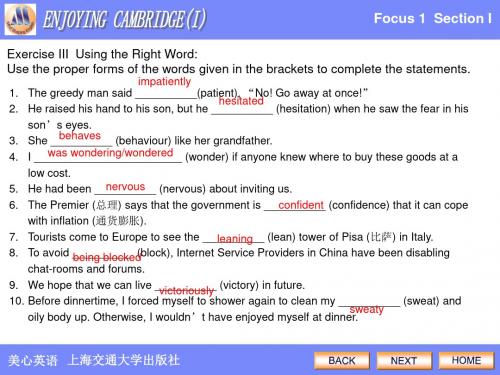
a. The kid __w_e_n_t__ into his room and shut the door. b. She tried to blow out all the candles on the cake in one __g_o_. (3) rest n. & vi. a. You may take a __r_e_s_t __ after that class. b. I see a bird __r_e_st_in_g_ on the roof. (4) drink n. & vt. a. Are there any soft _d_r_in_k_s__ in the refrigerator? b. She __d_r_in_k_s_ milk before going to bed every night. (5) feel n. & vi. a. I _a_m_ not __fe_e_l_in_g_ well now, so I can’t dine out with you. b. The _______ of the meeting is tense.
美心英语 上海交通大学出版社
Focus 1 Section I
Exercise VII.1 Translation: Translate the following sentences into Chinese. (1) She’s been dating him for months but she’s still not very serious. 她__跟_他__约__会__几__个_月__了__,__但__她__还_不__是__很__认__真_。____ (2) Tom came close to falling off the high wall. 汤__姆__差__点__从_高__墙__上__跌__下__来_。________________ (3) He goes for the world record. _他__想_创__造__世__界__纪_录__。______________________ (4) The magician escaped from the cage with his hands tied behind his back. _魔__术_师__双__手__反__绑_着__从__笼__子__里__逃_了__出__来__。_______ (5) She must have had a cold, for she had a fever and a runny nose. 她__一__定__是__感_冒__了__,__因__为__她_发__烧__,__还__流_鼻__涕__。____
应用型大学英语综合教程第一册第三章课件

F. With his severance payment. G. With the money given by his children. H. With the money left by his parents. I. With his savings.
M: Because I was much hurt from last year’s job seeking experience. You know what the two bosses said to me? They said directly to my face, “You look very tired.” “You look run down.” I’m tired of it.
The Beginning (Paras. 1-4)
More and more unemployed people are spending their severance pay on plastic surgery.
Body (Paras. 5-16)
Senior people, together with some professionals and high executives, in order to get a competitive advantage in job-seeking, are undergoing plastic surgery too.
The End (Paras. 17-19)
The effect of plastic surgery and other forms of cosmetic treatment is still not clear.
综合教程第一册(上海外语教育出版社)unit 1

• Unit 1 Translation 1.He has prepared answers to the questions that he expects to confront during the interview. 2.His sad story touched us so deeply that we nearly cried. 3.The two of them are walking hand in hand along the river bank, chatting, laughing, and looking happy. 4.When he heard the exciting news, tears of joy welled up in his eyes. 5.People from Shanghai can understand Suzhou dialect with ease, for Shanghai dialect and Suzhou dialect have much in common.
13
• Lock it away within you
– Fasten it firmly in your mind; imprint it on your mind; bear it in your mind and never forget it.
• …in that place in your heart where summer is an always time.
10
• Stare – 1) look steadily for a long time, esp. in great surprise or shock E.g. He sat staring into space, thinking deeply. – 2) be very plain to see; to be obvious E.g. The lies in the report stared out at us from every paragraph. – * stare off: stare away; to move one’s eyes
实用英语综合教程第一册4
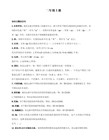
The First Four Minutes
1. When do people decide whether or not they want to become friends? During their first four minutes together, according to a book by Dr. Leonard Zunin. In his book, Contact: The First Four Minutes, he offers this advice to anyone interested in starting new friendships: "Every time you meet someone in a social situation, give him your undivided attention for four minutes. A lot of people's whole lives would change if they did just that."
4. On the other hand, we should not make the other person think we are too sure of ourselves. It is important to appear interested and sympathetic, realizing that the other person has his own needs, fears, and hopes.
a. 自信的
confident
a. 有信心的,自信的
sympathetic
a. 1. showing favour or approval 赞同的2. 同情的,有同情心的
实用英语第一册教案.doc
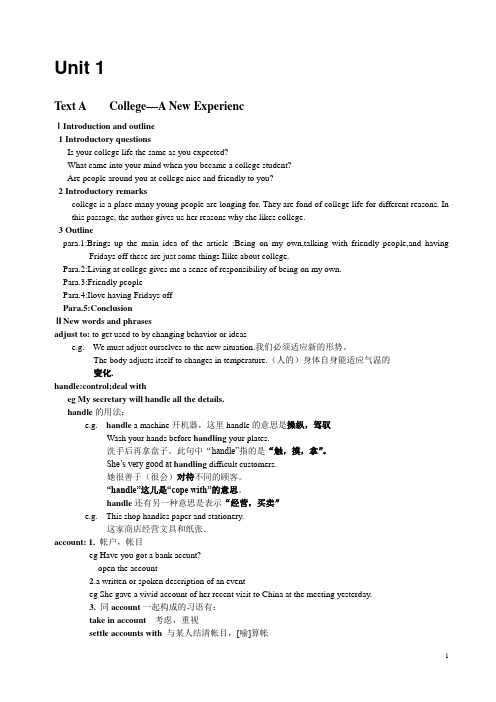
Unit 1Text A College—A New ExperiencⅠIntroduction and outline1 Introductory questionsIs your college life the same as you expected?What came into your mind when you became a college student?Are people around you at college nice and friendly to you?2 Introductory remarkscollege is a place many young people are longing for. They are fond of college life for different reasons. In this passage, the author gives us her reasons why she likes college.3 Outlinepara.1:Brings up the main idea of the article :Being on my own,talking with friendly people,and having Fridays off these are just some things Ilike about college.Para.2:Living at college gives me a sense of responsibility of being on my own.Para.3:Friendly peoplePara.4:Ilove having Fridays offPara.5:ConclusionⅡNew words and phrasesadjust to: to get used to by changing behavior or idease.g. We must adjust ourselves to the new situation.我们必须适应新的形势。
综合教程第一册(上海外语教育出版社)unit4 ppt
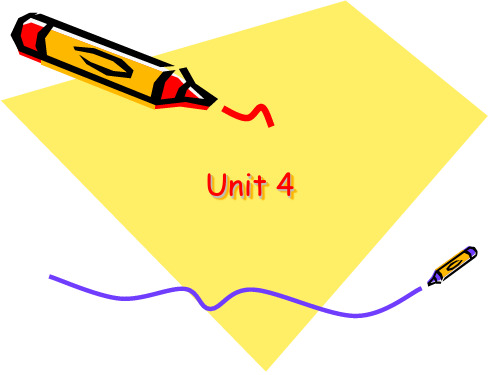
• Part Five: (paragraph 22)
– this part is a logical and natural conclusion. It also points out a solid historical fact: the time we are living in now was also a “wonderful future” to the people who lived 100 years before.
• Dock:
– The area of water between two piers or alongside a pier that receives a ship for loading, unloading or repairs. – E.g. this is a very busy dock, where some ships are being loaded, some are being unloaded, and others repaired.
• Part Two: (Paragraphs 5-7)
– this part describes a journey into space in the future. Paragraph 5 is a transitional paragraph, connecting the preceding part with the following part. Paragraph 6-7 describe a future journey to the Moon, the Mars and the Venus., with more details about a visit to the moon. The descriptions are presented in the chronological order and from near-to-far space perspective. It is to be noted that the proper nouns---the Moon Camp, the Mars Colony and the Venus Exploration Outpost---are very important places which deserve our attention.
应用型大学英语综合教程第一册第一章课件
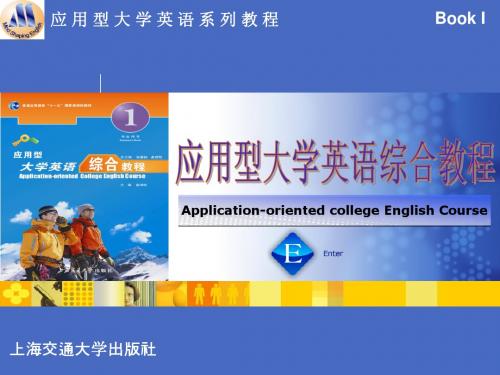
Book I
Application-oriented college English Course
上海交通大学出版社
Course Description
Expectation: Finish every task on time Be brave and active in discussion Don't be shy and try to make learning fun together
Back
上海交通大学出版社
Next
Text Lead-in
Text Organization
Introduction (Para.1)
5
Introduction to the hero of the story: Monty Roberts, who owns a horsehe teacher failed him and required him to rewrite the paper.
Monty persevered in his dream until he realized it.
Conclusion (Para. 10) Don’t let anyone steal your dreams. Follow your heart, no matter what.
6
put on:at 1)risk 举办(展览等);演出 ranch: 牧场 youth programs: youth at 不要让别人偷走你的梦想 fund-raising: 筹募基金活动 (戏剧) risk refers to those young who e.g. He is dreaming ofpeople owning a Meaning: He has allowed me to e.g. A charity walklooked is a fund-raising 1 我有个朋友叫蒙蒂·罗伯兹,他 are not properly after or e.g. The gallery will put on an ranch in North America. collect funds to finance social services event. 在圣伊斯德罗有个牧马场。他把住宅 educated and have a tendency to exhibition ofa his latest works offers this Note that large ranch for those young people who are in danger 借给我举办募款活动,为问题青少年 commit wrongdoingscampaign such as being The fund-raising was weekend. horseback riding, rafting, fishing, and of going astray/becoming juvenile 项目筹备基金。 addicted to alcohol, drugs, and so on. kicked off by a tours; millionaire. 2) 穿上,戴上 mountain bike owning delinquents (青少年犯罪分子 ). a ranch at risk: 有危险,有风险 may be the life-long dream for many e.g. The fire suddenly broke out. Americans. e.g. didIfnot wehave go to She thewar, timeinnocent to put lives will socks on. be put at risk.
大学英语精读第一册上海外语教育出版社Unit1some strategies for learning English(1)

learing methods
3 Emotion aim: To love English
and develop students' oral English
小先生
Tell us an English story and your
Unit 1 Some strategies for learning English (1)
制作:穆 主讲:穆 莹 莹
Review 复习提问:
Dictate the words that we have learned
in last lesson
Lead-in 新课导入:
AIMS 职业综合能力培养目标: 1 Knowledge aim: To grasp the basic points
at fault: guilty of error; deserving blame
at a time :
on one occasion 每次,一次
be bound to: be certain to 肯定会
Example: Differences of opinion on various issues are bound to exist.
word
grammar listening reading ……
Language learning strategies: Language learning strategies are used by learners to complete speaking, reading, vocabulary, listening or writing activities presented in language lessons.
《实用英语综合教程》第一册Units1-6教案

《实用英语综合教程》第一册Units1-6教案Unit 1 EducationTeaching objective1. read what Bill Gates says about education;2. build up your vocabulary relating to campus life;3. get to know about the vocational education in Germany;4. study different types of nouns;5. write an introduction of yourself.Teaching focuses:1. Vocabulary: (omitted)2. Grammar: Nouns3. Practical writing: short passage to introduce yourselfTeaching steps:Step 1: Warm-up Discussion; study of words and expressions in Text AStep 2: Discussion of Text AStep 3: Comprehensive ExercisesStep 4: Grammar Tips; Active Words and V ocabulary Check Step 5: Discussion of Text B and the follow-up ComprehensionStep 6: Practical WritingStep 7: Starting Out & In-class Activities (Practical Listening and Speaking Course)Step 8: Cultural Notes & After-class Activities (Practical Listening and Speaking Course) Teaching methods:(1)Practice speaking and listening(2)Discussion(3)Presentation and role play(4) ExercisesTeaching ProceduresWarm-up Discussion and background information1. Bill Gates:(Bill) H. Bill Gates is the co-founder, chairman and chief software architect of Microsoft Corporation, the world’s largest and most profitable software company. And he is also the richest man in the world.Gates was born in 1955, in Seattle, Washington.●Gates attended the private Lakeside School. There, he discovered his interest in software and began programming computers at age 13.●Gate s went off to Harvard University in 1973 with the original intention of becoming a math professor. It was during his Harvard days that he and his friend developed BASIC (Beginner’s All-purpose Symbolic Instruction Code), the programming language for the first microcomputer. Gates left Harvard in 1975 without completing his university education.●He started Microsoft at the age of 19, and made a deal that changed the landscape of computing forever.●Gates announced in 2006 that he would be transitioning from full-time workat Microsoft to part-time work, and full-time work at the Bill & Melinda Gates Foundation to enhance healthcare and reduce extreme poverty in the world2. HarvardHarvard University, founded in 1636, is America’s oldest institution of higher learning. The university was named after its first benefactor, John Harvard of Charlestown. Since its founding, the university has grown from nine students with a single master to an enrollment of more than 18,000 degree candidates, including undergraduates and graduate students in 10 principalacademic units. An additional 13,000 students are enrolled in one or more courses in the Harvard Extension School.Text A : Education does countStudy of words and expressions in Text A/doc/8818832061.htmlcation n.教育educate v.教育educated adj. 受教育的educator n. 教育家,教育者1. Children in poor areas receive free education.2. The writer was educated at a very good school3. a well-educated man2. count v.有重要意义,有价值1. Every second counts.2. What counts more is whether you have tried your best.3. hundreds of 好几百,许许多多1. Hundreds of journalists attended the press conference.2. More than two hundred journalists attended the press conference.4. advice n. 忠告,建议advise vt. 忠告,建议1. She advised that I (should) wear my best suit.2. I was advised not to go there alone at night.5. drop out of 退学,不参与,退出1. He dropped out of school at the age of 10 because his family was too poor to afford the tuition.2. She decided to drop out of the competition because it was not fair.6. a …number of 若干1. A number of students didn’t want to have a spring outing.7. ask for 询问,寻求1. If you ask for my advice, that color doesn’t suit you.2. May I ask for the telephone number of the Grand Hotel?8. suggestion n.意见,建议at/on sb.’s suggestion 根据某人的建议make/offer a suggestion 提议,建议1. At/On her suggestion we went to Beijing by train.2. We will listen to anyone who makes/offers suggestions for the theme of the party.9. success n.成功,胜利succeed vi. 成功;达到;完成1. Failure is the mother of success.2. He succeeded in the examination.3. He succeeded in making his dreams come true.10. advantage n. 有利条件,好处;优点,优势advantageous adj. 有利的,有益的;便利的advantageous adj. 有利的,有益的;便利1. Mary speaks good English. Her advantage is that her mother is an English.2. This product has many advantages.3. It is highly advantageous to us.11. lifetime n. 一生,终生chance of a lifetime 千载难逢的良机,一生中唯一的机会1. a lifetime guarantee2. In my father’s lifetime there have been many changes in the village.3. It’s the chance of a lifetime. You will regret it the rest of your life if you don’t take it.12. programmer n. 程序师,编程员program vt.编制程序(亦作:programme)1. Please program the computer to do the job instead of doing it manually.13. discourage vt. 不鼓励;使泄气,使失去信心discouraged adj. 泄气的,失去信心的discouraging adj. 使人泄气的,使人失去信心的1. His parents discouraged him from joining the air force.2. If you meet with any difficulty in your study, don’t be discouraged.3. It is discouraging that I didn’t know how to solve the maths problem.encourage vt.鼓励courage n. 勇敢,勇气4. I encouraged her to work hard and to try to pass the examinations.5. She showed remarkable courage when she heard the bad news.14. diploma n. 文凭,毕业证书diplomatic adj. 外交的,从事外交的1. Julia joined the diplomatic service after her graduation from the university.15. spirit n. 精神in good/high/great spirits 精神好,高兴,兴致好in low/poor spirits 意志消沉,垂头丧气,怏怏不乐1. She is in good / high / great spirits these days because her son is returning from England.2. Do you know what happened to him? He seems to be in low/poor spirits.16. focus v. (使)集中;(使)聚焦1. All eyes (were) focused on the speaker.2. Because of his strange clothes, he immediately became the focus of attention when he entered the office.17. range (1) n. 范围(2) vi.在某范围内变化1. You have a wide range of choices.2. The temperature ranges from 10 to 20 degrees.3. The students’ages range between 15 and 18.18. try out 试验,考验1. She bought a cookbook and tried out a few new recipes.2. We tried out the project within a small range at first.19. in short 简而言之,总之1. In short, you should study hard for a better future.Synonym:in brief / to sum up / all in all / in conclusion20. They want to know what to study, or whether it’s OK to drop out of college since that’s what I did.:They want to know what they should study or whether it is fine for them to leave college without completing the education since I did it myself.what to study:This is a “wh-word + infinitive”structure used as the object, which can be changed into an object clause. “Wh-wo rd + infinitive”structure can be used as a subject, an object, or an appositive, etc., functioning as a subject clause (主语从句), an object clause (宾语从句) or an appositive clause (同位语从句).21. it’s OK to drop out of college: Here “it”is used as a formal subject, and the actual subject is the infinitive structure “to drop out of college”. The structure is “It is + adj. + (for / of + sb.) to do sth.”More example:1. It was very thoughtful of her to come to see me when I was ill.2. It is careless of you to make such a mistake.3. It is easy for me to see through his trick.22. That’s what I did: “what I did”here is a predicative clause (表语从句) introduced by “what”. The structure is “subject + be / look / remain / seem + predicative clause”and the predicative clause can be introduced by such words as“that”(often omitted), and other wh-words.For example:1. It seems (that) it is going to rain.2. The question remains whether we can win the game.3. This is why I refused to attend the meeting.23. As I’ve said before, nobody should drop out of college unless they believe they face the chance of a lifetime. And even then they should consider carefully.:Para: Everyone should complete their college education unless they are sure they have met the best chance in their lifetime. Even in that situation they should give it their serious consideration As I’ve said before: This is a non-restrictive relative clause (a “relative clause”is also referred to as an “attributive clause”) introduced by “as”(正如……的那样), which can be placed at the beginning or at the end of the sentence.More examples:1. As people expected, she was admitted to Beijing University.unless: “unless” is a conjunction for an adverbial clause of condition (条件状语从句), which means “if… not … (除非)”.More examples:1. I won’t leave unless the rain stops.2. Unless you have a good command of both English and Chinese, you cannot be a good translator.24. In my company’s early years, we had a bright part-time programmer who planned to drop out of high school to work.: During the early years after my company was started, we had an intelligent programmer who worked part-time for us. He intended to quit high school and work. plan to: intend to do sth. 计划、打算做某事1. I plan to make a trip to Beijing during the summer vacation.2. I will always be with you no matter what you plan to do.25. who planned to …work: a restrictive relative clause (限制性关系从句) introduced by “who”since its antecedent is a person and serves as the subject in the clause. The relative pronoun “that”can be use d here too.26. Quite a few of our people didn’t finish college, but we discourage dropping out. Having a diploma certainly helps somebody who is looking to us for a job.: A large number of people in our company didn’t complete their college education, but we don’t encourage others to drop out of school. It is helpful for those who want to work in our company to have a diploma.look to sb. / sth. for sth.: to depend on sb. or sth. for help or advice 指望,依赖1. They are looking to the teacher to suggest a place for their spring outing.27. High school and college offer you the best chance to learn many things and to do projects with others that teach you about team spirit.: High school and college are the best places where you can learn many things and do projects with others, which helps to cultivate your sense of cooperation with others.that teach you about team spirit: This is a restrictive relative clause introduced by “that”, whose antecedent acts as the subject of the clause. Actually the relative clause introduced by “that”can be used to modify both the person(s) and the thing(s), and the role of “that” can be either the subject or the object.More examples:1.He was the only one that I knew there.2. I haven’t been to the place that you have mentioned.3. The bicycle that was stolen last week was brand new.28. In high school there was a time when I was highly focused on writing software, but for most of my high school years I had many interests: I was deeply absorbed in writing software for a period of time in high school, but for most of the time at high school I took interest in many things.when …software: This is a relative clause introduced by the relative adverb “when”, which acts as the adverbial of time in the clause.More examples:1. There was a time when I completely lost my self-confidence, and her support and patience helped me regain it.2. I will never forget those days when we were together.29. But somebody handing you a book doesn’t automatically start your learning. You should learn with other people, ask questions, try out ideas and have a way to test your ability.: But it doesn’t mean that you are learning spontaneously when someone gives you a book. You should find some other people to learn with, ask them questions, see if ideas work and find a way to evaluate your ability.30. In short, it’s a real mistake not to take the chance to study a wide range of subjects and to learn to work with other people because education does count.: To sum up, it is wrong not to take the chance to study various subjects and to learn to work with other people, because education is really important.it’s a real mistake not to take the chance: This is an infinitive structure of negation, where “not”is placed before the infinitive.More examples:1. We are asked not to speak loudly in class.2. It is a good idea not to go out on such a rainy day.Grammar Nouns一、名词的概念: 表示人、事物或抽象概念的词叫做名词。
实用英语综合教程1_第四版_Unit_1Text_A

3. Are you sure you can always get help from others when you need it?
1 The idea of helping people comes naturally to most of us. If we see a blind person getting off a bus, we watch to
make sure that he is in no danger of falling. Members of a family help one another, with particular care for the very young and the elderly.
While-Reading Task
A helping hand and a friendly face can mean a great deal to a lonely elderly person.
4 Handicapped people may be young or old. People confined to wheelchairs cannot go out unless somebody takes them. Blind children may love swimming but they need a sighted swimmer to go with them. Some handicapped people may be unable to go out at all and a visitor is then more than welcome. Voluntary help is needed in hospitals. There are library and shop trolleys to be taken round the wards and at Christmas time decorations to be put up and parties and concerts to be organized. Some volunteers help to run playgrounds for young children during school holidays and also look after children in preschool play groups.
应本一Unit1大学英语 第一册 上海交通大学出版社
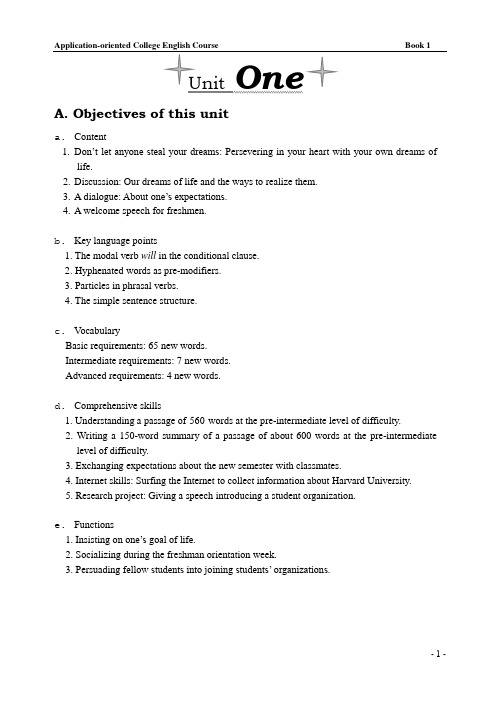
Unit OneA. Objectives of this unita.Content1.Don‟t let anyone steal your dreams: Persevering in your heart with your own dreams oflife.2.Discussion: Our dreams of life and the ways to realize them.3.A dialogue: About one‟s expectations.4.A welcome speech for freshmen.b.Key language points1. The modal verb will in the conditional clause.2. Hyphenated words as pre-modifiers.3. Particles in phrasal verbs.4. The simple sentence structure.c.V ocabularyBasic requirements: 65 new words.Intermediate requirements: 7 new words.Advanced requirements: 4 new words.prehensive skills1. Understanding a passage of560words at the pre-intermediate level of difficulty.2. Writing a 150-word summary of a passage of about 600 words at the pre-intermediatelevel of difficulty.3. Exchanging expectations about the new semester with classmates.4. Internet skills: Surfing the Internet to collect information about Harvard University.5. Research project: Giving a speech introducing a student organization.e.Functions1. Insisting on one‟s goal of life.2. Socializing during the freshman orientation week.3. Persuading fellow students into joining students‟ organizations.B. Procedures and MethodsEight teaching periods are needed to cover the present unit, among which four periods are for the module of Language Skills Development, three periods for the module of Language in Use and one mainly for the module of Enhancement of Language Abilities.I. Part 1 Language Skills Development1. Period One and Period Two:●Step One: StarterA. Read the lyrics of a song. Listen to the tape or the CD and sing in chorus. Ask thestudents to listen to the song and understand the general meaning of it. Then ask some questions related to the song and then shift to Part B.B. Listen to a short passage entitled “My Dream” and answer the questions.Before playing the tape, the instructor can ask the students to take a look at the three questions first. Then the instructor tells the students to listen to the passage with the questions in mind. After listening to the passage, ask the students to answer the questions.This step shall take up 10-15 minutes.●Step Two: New words and expressionsGo over the key words and expressions in the text (refer to Student‟s Book Pages 5-7) to prepare students for the text learning.The time for this step should not exceed 10 minutes.●Step Three: Text teachingStart teaching the text: Don‟t let anyone steal your dreams. Before delving into the text, ask students a general question about the text such as “How come one can steal your dream? Isn‟t a dream something in your head that no one can touch?”Then start the detailed study of the text and go through the text paragraph by paragraph. Help students understand the story and explain language points meanwhile.After that the text organizational chart will be presented so that the students can expand each episode.Then start the detailed study of the text and go through the text paragraph by paragraph. To help students understand the story, the instructor can explain the language points and ask students to answer the questions related to the text.This step shall not take up more than one and a half periods.2.I have a friend named Monty Roberts who owns a horse ranch in San Ysidro. 我有个朋友叫蒙蒂·罗伯兹,他在圣伊斯德罗有个牧马场。
21世纪大学实用英语综合练习第一册答案
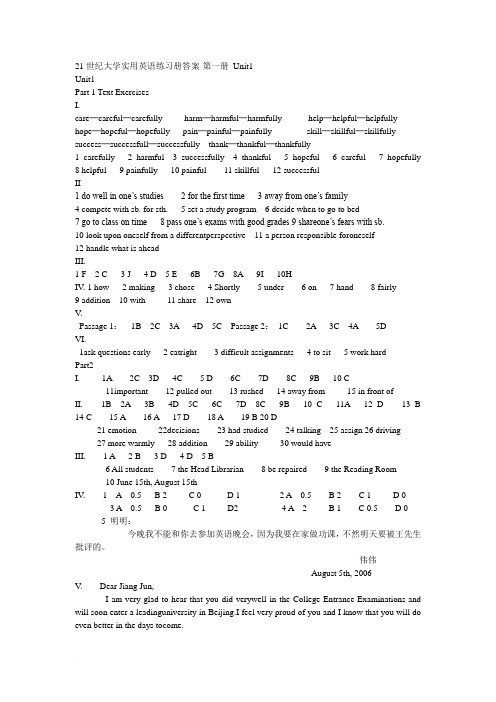
21世纪大学实用英语练习册答案-第一册Unit1Unit1Part 1 Text ExercisesI.care─careful─carefully harm─harmful─harmfully help─helpful─helpfully hope─hopeful─hopefully pain─painful─painfully skill─skillful─skillfully success─successfull─successfully thank─thankful─thankfully1 carefully2 harmful3 successfully4 thankful5 hopeful6 careful7 hopefully8 helpful9 painfully 10 painful 11 skillful 12 successfulII1 do well in one’s studies2 for the first time3 away from one’s family4 compete with sb. for sth.5 set a study program6 decide when to go to bed7 go to class on time 8 pass one’s exams with good grades 9 shareone’s fears with sb.10 look upon oneself from a differentperspective 11 a person responsible foroneself12 handle what is aheadIII.1 F2 C3 J4 D5 E 6B 7G 8A 9I 10HIV. 1 how 2 making 3 chose 4 Shortly 5 under 6 on 7 hand 8 fairly9 addition 10 with 11 share 12 ownV.Passage 1:1B 2C 3A 4D 5C Passage 2:1C 2A 3C 4A 5DVI.1ask questions early 2 eatright 3 difficult assignments 4 to sit 5 work hardPart2I. 1A 2C 3D 4C 5 D 6C 7D 8C 9B 10 C11important 12 pulled out 13 rushed 14 away from 15 in front ofII. 1B 2A 3B 4D 5C 6C 7D 8C 9B 10 C 11A 12 D 13 B 14 C 15 A 16 A 17 D 18 A 19 B 20 D21 emotion 22decisions 23 had studied 24 talking 25 assign 26 driving27 more warmly 28 addition 29 ability 30 would haveIII. 1 A 2 B 3 D 4 D 5 B6 All students7 the Head Librarian8 be repaired9 the Reading Room10 June 15th, August 15thIV. 1 A 0.5 B 2 C 0 D 1 2 A 0.5 B 2 C 1 D 03 A 0.5 B 0 C 1 D24 A 2 B 1 C 0.5 D 05 明明:今晚我不能和你去参加英语晚会,因为我要在家做功课,不然明天要被王先生批评的。
实用英语第一册教案unit 1 上海交通大学出版社

Unit OneA Teaching Objectivesa. Contents of the text:Focus 1: Help the students learn a lesson from the story—Look beyond the obvious and allow miracles to be created in our life.Focus 2: The importance and necessity of crying.b. Key language points in the text:Focus 1: 1. Words such as graduate, purchase, hand, regret, desire may function both as a verb and a noun.2. Present participle used as adverbials of time, cause and result, etc.3. Absolute construction introduced by the preposition with.c. Vocabulary:Focus 1: 31 B-level words, 11 A-level words, and 4 phrases and expressions listed under Vocabulary.Focus 2: 30 B-level words, 20 A-level words, and 8 phrases and expressions listed under Vocabulary.d. Comprehensive skills:Understand a passage at the pre-intermediate level of difficulty and on this basis, be able to write a summary of the text.e. Functions:Focus 1: Expressing Thanks.Focus 2: Writing a Thank-you Letter.B Procedures and MethodsEight teaching periods are needed to cover the present unit.1. Period One and Period Two:●Step One:a. Background information:Graduation Day in the West “There’s a time for joy/A time for tears/A time we’ll treasure through the years/We’ll remember always Graduation Day…” This is a song entitled Graduation Day by Beach Boys. For graduates and their families, Graduation Day marks a unique moment in time: a celebration of years passed, while looking forward to the endless possibilities of the countless hours that lay ahead. To celebrate, a ceremony is usually held at school on which students wear cap and gown for this special moment and the song “Pomp & Circumstances” is the standard march. At home, parents usually throw a party for their children and special gifts are also necessary.b. warm-up questionsHow is the relationship between you and your father?What is the best gift you have ever received from your father?(The warm-up exercise shall not take up more than 8 minutes.)●Step Two: Go over the key words and expressions in the text.*graduate vi. 毕业n. [C](大学)毕业生,研究生He graduated from Beijing University in 1998.☆admire vt. 羡慕,赞赏,钦佩I really admire you for havingsuch a big house.*faithful a. 忠诚的,忠实的;如实的One cannot be too faithful toone’s du ty.☆prosperous a.(经济上)成功的;繁荣的,昌盛的His business is prosperous.*business n. [C, U] 商号,企业;商业,生意;事务He works for a shoe business.*afford vt. 买得起,负担得起;提供,给予This sofa is expensive. I am afraid that I can’t afford it.*graduation n. [U, C] 毕业典礼;毕业Some of my classmatesdidn’t attend the graduation.☆approach vi./vt. 靠近,接近n. [U, C] 接近;途径,入门;方式,方法As summer approached, the weather became hotter.☆await vt.(人)等候,期待,(事件等)等待(处理)I am awaiting your reply.*purchase vt. 买,购买n. [C, U] 购买的物品She purchased a new car last month.*private a. 私人的,个人的;秘密的,私下的Don’t read my private letters without my permission.*curious a. 好奇的When I mentioned his name,everyone was very curious. *disappointed a. 失望的,沮丧的,失意的My parents will bedisappointed if I fail theexam.☆depressed a. 抑郁的,沮丧的,意志消沉的She was depressed because of failing in the final exam.*successful a. 成功的,有成就的His father is a successfulbusinessman.☆domestic a. 家(庭)的,家用的;国内的,本国的;驯养的He had a good many domestic troubles.*arrangement n. [C] [常pl.] 安排,筹备Arrangements have beenmade to give the foreignguests a warm welcome.△will vt. 将(财产等)遗赠My father willed his house tome.*possession n. [C] [常pl.] 财产,私人物品He lost all his possessions inthe fire.*sadness n. [U] 悲伤,悲痛,难过;使人悲伤(或难过)的事When their grandfather died, a great sadness filled their lives.*regret n. [U] 遗憾,懊悔,抱歉vt. 遗憾,懊悔,抱歉The manager expressed his regret at the failure of the talks.*search vi./vt. 搜索,寻找,探查n. [C] 搜索,寻找,探查He searched through his pocket for some money.*desire vt. 渴望,想望,要求n. [C, U] 愿望,欲望,要求Young people all desire independence.*exactly ad. 精确地,准确地Do exactly as the teachersaid.*expect vt. 期待,等待;预料You can’t expect me toapprove of it.△affirmation n. [C] 声明,断言She made an affirmation thatshe was loyal to her husband.*beyond prep. 在……的外边,远于;超出ad. 在更远处Beyond the mountains is another village.*allow vt. 允许,准许;允给My parents don’t allow me tosmoke.*create vt. 创造,创作;引起,产生Many people believe thatGod created the world.get ready to do sth. 准备好做某事lead a…life 过(活);使过(某种生活)pass away 去世take care of 处理,照顾Step Three: Start to teach the text para. by para. Help students understand the text and explain language points meanwhile.Questions about Para. 1(1) What was the young man in our story getting ready to do?(2) What did he want from his father as a gift for him?(3) Could his father afford it?Notes of Para 1:A young man was getting ready to graduate from college. 一个年轻人即将从大学毕业。
实用英语综合教程第一册教案
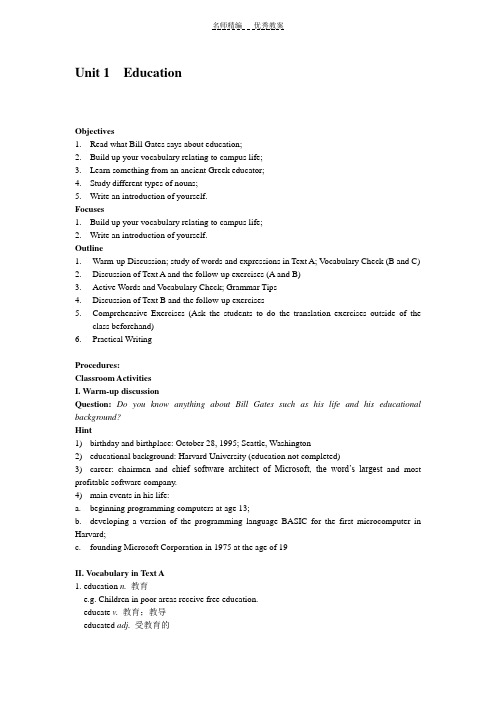
Unit 1 EducationObjectives1.Read what Bill Gates says about education;2.Build up your vocabulary relating to campus life;3.Learn something from an ancient Greek educator;4.Study different types of nouns;5.Write an introduction of yourself.Focuses1.Build up your vocabulary relating to campus life;2.Write an introduction of yourself.Outline1.Warm-up Discussion; study of words and expressions in Text A; Vocabulary Check (B and C)2.Discussion of Text A and the follow-up exercises (A and B)3.Active Words and V ocabulary Check; Grammar Tips4.Discussion of Text B and the follow-up exercisesprehensive Exercises (Ask the students to do the translation exercises outside of theclass beforehand)6.Practical WritingProcedures:Classroom ActivitiesI. Warm-up discussionQuestion: Do you know anything about Bill Gates such as his life and his educational background?Hint1)birthday and birthplace: October 28, 1995; Seattle, Washington2)educational background: Harvard University (education not completed)3)career: chairmen and c hief software architect of Microsoft, the word’s largest and most profitable software company.4)main events in his life:a.beginning programming computers at age 13;b.developing a version of the programming language BASIC for the first microcomputer in Harvard;c.founding Microsoft Corporation in 1975 at the age of 19II. Vocabulary in Text A1. education n.教育e.g. Children in poor areas receive free education.educate v.教育;教导educated adj.受教育的e.g. a well-educated maneducator n.教育家,教育者2. count v.派用场,点数e.g. 1) Every seconds counts.2) What counts more is whether you have tried your best.3) to count from 1 to 1004) Count these apples.3. advantage n.有利条件,好处;优点,优势e.g. This product has many advantages.advantageous adj.有利的,有益的,便利的e.g. It is highly advantageous to us.Phrase: take advantage of 很好的使用;利用e.g. take advantage of all educational opportunitiesAntonym: disadvantage n.不利;不利条件e.g. His bad health is a great disadvantage to him when he looks for work.4. lifetime n.一生,终生e.g. 1) a lifetime guarantee2)lifetime membership3) In my father’s lifetime there have been many changes in the village.5. part-time adj.& adv.兼职的(地)e.g. 1)a part-time job2)He works part-time.full-time adj.全职的e.g. a full-time housewife6. programmer n.程序师,编程员program v.编制程序e.g. Please program the computer to do the job instead of doing it manually(手工操作).7. discourage vt. 不鼓励;使泄气,使失去信心e.g. His parents discouraged him from joining the air force.discouraged adj. 泄气的,失去信心的discouraging adj.使人泄气的,使人失去信心的e.g. 1) If you meet difficulty in your study, don’t be discouraged.2) It is discouraging that I didn’t know how to solve the problem.Antonym: encourage vt.鼓励e.g. I encouraged her to work hard and to try to pass the examinations.courage n. 勇敢,勇气e.g. David showed great courage when he saved the child from the burning house.8. diploma n. 文凭,毕业证书e.g. a college diplomadiplomatic adj. 外交的,从事外交的e.g. Julia joined the diplomatic service after her graduation from university.9. project n.项目,课题e.g. 1) an impossible project2) The professor is directing a research project.Synonym: plan10. highly adv. 高度地;非常e.g. 1) a highly interesting story2) a highly paid jobPhrase: speak/ think highly of 赞扬,对…给予很高评价e.g. The leader speaks / thinks highly of our work.11. focus v.(使)集中;(使)聚焦e.g. 1) to focus (one’s mind) in work2) All eyes focused on the speaker.focus n.(兴趣活动等的)中心,焦点e.g. Because of his strange clothes, he immediately became the focus of attention when heentered the office.12. range n. 范围e.g. You have a wide range of choices.range vi.在某范围内变化e.g. The temperature ranges from 10 to 20 degrees.13. attend v.参加,出席e.g. attend schoolattend a lectureattendance n.出席,到场14. automatically adv.自动地e.g. the machine operates automatically.automatic adj.自动的e.g. We have an automatic washing machine.15. drop out of 退学,不参与,退出e.g. 1) He dropped out of school at the age of 10 because his family was too poor to afford thetuition.2) She decided to drop out of the competition because it was not fire.16. chance of a lifetime 千载难逢的良机,一生中唯一的机会e.g. It’s the chance of a lifetime. You will regret it the rest of your life if you don’t take it.17. try out 试验,考验e.g. She bought a cookbook and tried out a few new recipes.18. in short 简而言之,总之e.g. In short, you should study hard for a better future.Synonym: in brief/ to sum up/ all in all/ in conclusionIII. Language Points in Text A1.They want to know what to study, or whether it’s O k to drop out of college since that’s what I did.what to study: This is a wh-word + infinitive structure used as the object, which can be changed into an object clause. Wh-word + infinitive structure can be used as a subject, an object, or an appositive clause(同位语从句),for example:1)How to improve their English is often discussed among the students.2)We haven’t decided when to visit the place.3)You haven’t answered my question about wh ere to get these books.it’s Ok to drop out of college: Here “it” is used as a formal subject, and the actual subject is the infinitive structure “to drop out of college”. The general pattern is “It is + adj. + (for/ of + sb.) to do sth.” More examples:1)It was very thoughtful of her to come to see me when I was ill.2)It’s easy for me to see through his trick.that’s what I did: “what I did” here is a predictive clause (表语从句)introduced by “what”. It is always structured in the form of “subject + be/ look/ rem ain/ seem + predictive clause” and can be introduced by such words as “that” (always omitted), and other wh-words, for example:1) It seems (that) it is going to rain.2) This is why I refused to attend the meeting.2. As I’ve said before, nobody should dr op out of college unless they believe they face the chance of a lifetime.As I’ve said before: This is a non-restrictive relative clause(非限制性关系从句) introduced by “as”(正如…的那样), which can be placed at the beginning or at the end of the sentence. More examples:1) As people expected, she was admitted to Beijing University.2) Hundreds of people were killed in the earthquake, as I have learned from the newspaper. unless: is a conjunction for an adverbial clause of condition (条件状语从句), which equals “if…not…”(除非).e.g. I won’t leave unless the rain stops.3. In my company’s early years, we have a bright part-time programmer who planned to drop out of high school to work.planned to: intend to do sth.计划、打算做某事e.g. I plan to make a trip to Beijing during the summer vocation.who planned to …work: a restrictive relative clause introduced by “who” since its antecedent is a person and serves as the subject in the clause. The relative pronoun “that” can be used here too. More examples:1) The young man who sits there quietly is my brother.2) I don’t like people that pry into others’ private business.4. Having a diploma certainly helps somebody who is looking to us for a job.look to sb./ sth.: to depend on sb. or sth. for help or advice 指望,依赖e.g. We look to you for support.5. High school and college offer you the best chance to learn many things and to do projects with others that teach you about team spirit.that teach you about team spirit: This is a restrictive relative clause introduced by “that”, whose antecedent acts as the subject of the clause. Actually the relative clause introduced by “that” can be used to modify both the person or the thing, and the roll of “that” can be either the subject or the object.e.g. He was the only one that I knew there.I haven’t been to the place that you have mentioned.6. In high school there was a time when I was highly focused on writing software, but for most of my high school years I had many interests.when …software: This is a relative clause introduced by the relative adverb “when”, which actsas the adverbial of time in the clause.e.g. 1) There was a time when I completely lost my self-confidence.2) I will never forget those days when we were together.7. For me, classroom is not the only place where you can learn.where you can learn: This is a restrictive relative clause introduced by the relative adverb “where”, which is used as the adverbial of place in the clause.e.g. 1) Do you still remember the restaurant where we had dinner last night?2) This is the place where he stayed his whole life.8. In short, it’s a real mistake not to take the chance to study a wide range of subjects and to learn to work with other people because education does count.it’s a real mistake not to take the chance: This is an example of a negative infinitive structure, where “not” is placed before an infinitive.e.g. 1) We are asked not to speak loudly in class.2) It is a good idea not to go out on such a rainy day.IV. Focus on Grammar名词(Noun )一、名词的概念表示人、事物或抽象概念的词叫做名词。
实用英语第一册电子教案
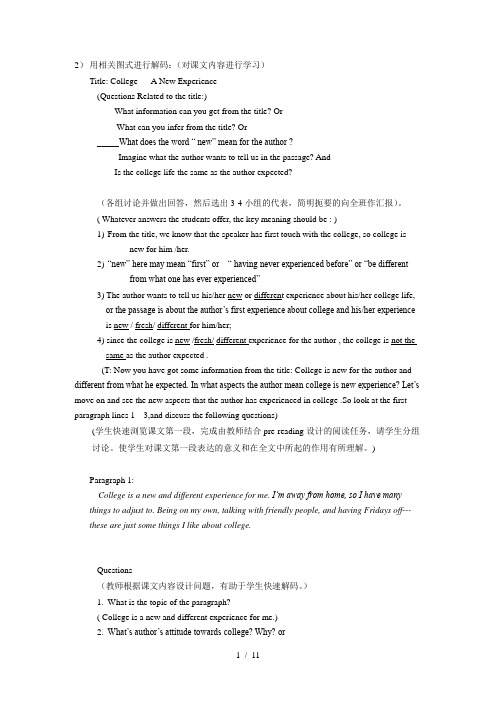
2)用相关图式进行解码:(对课文内容进行学习)Title: College---- A New Experience(Questions Related to the title:)____What information can you get from the title? Or____ What can you infer from the title? Or_____What does the word “ new” mean for the author ?____Imagine what the author wants to tell us in the passage? And____Is the college life the same as the author expected?(各组讨论并做出回答,然后选出3-4小组的代表,简明扼要的向全班作汇报)。
( Whatever answers the students offer, the key meaning should be : )1)From the title, we know that the speaker has first touch with the college, so college isnew for him /her.2)“new” here may mean “first” or “ having never experienced before” or “be differentfrom what one has ever experienced”3) The author wants to tell us his/her new or different experience about his/her college life,or the passage is about the author’s first experience about college and his/her experienceis new / fresh/ different for him/her;4) since the college is new /fresh/ different experience for the author , the college is not thesame as the author expected .(T: Now you have got some information from the title: College is new for the author and different from what he expected. In what aspects the author mean college is new experience? Let’s move on and see the new aspects that the author has experienced in college .So look at the first paragraph lines 1---3,and discuss the following questions)(学生快速浏览课文第一段,完成由教师结合pre-reading设计的阅读任务,请学生分组讨论。
2019最新大学英语第一册第四单元物理

Till a’ the seas gang dry, my dear, And the rocks melt wi’ the sun; And I will luve thee still, my dear, While the sands o’ life shall run. And fare thee weel, my only luve, And fare thee weel a while; And I will come again, my luve, Tho’ it were ten thousand mile!
应用型大学英语系列教程
Book I
Application-oriented college English Course
上海交通大学出版社
Table of Contents
2
Unit Four
Language Skills Development Language in Use Enhancement of Language
laOdndceer wagea’ivneststehtteletdreient,ryuonuk.must come round for dinner.
Translation
Back
Next
上海交通大学出版社
2. Text: The Powerful Gift of Love
12
1. How did the young woman find her seat on the bus?
13
2 It had been a year since Susan, 34, became blind. Due to a medical misdiagnosis she had been rendered sightless, and she was suddenly thrown into a world of darkness, anger, frustration and self-pity. And all she had to cling to was her husband, Mark.
- 1、下载文档前请自行甄别文档内容的完整性,平台不提供额外的编辑、内容补充、找答案等附加服务。
- 2、"仅部分预览"的文档,不可在线预览部分如存在完整性等问题,可反馈申请退款(可完整预览的文档不适用该条件!)。
- 3、如文档侵犯您的权益,请联系客服反馈,我们会尽快为您处理(人工客服工作时间:9:00-18:30)。
Unit FourA Teaching Objectivesa. Contents of the text:Focus 1: Help the young students appreciate youngsters’ naivety and genuineness as depicted in the text.Focus 2: Help students understand the instructions on the use of online dating services and be able to write an e-mail to a friend known through the Internet.b. Key language points in the text:Focus 1: 1. Words such as go and move may function both as a noun and as a verb. This isa case of conversion, which can also be regarded as a means of word formation.2. Perfective infinitives used with the modal verbs of can (could) and must:could (must) + have + -ed participle.c. Vocabulary:Focus 1: 37 B-level words, 9 A-level words, and 9 phrases and expressions listed under Vocabulary.Focus 2: 31 B-level words, 9 A-level words, and 14 phrases and expressions listed under Vocabulary.d. Comprehensive skills:Understand a passage at the pre-intermediate level of difficulty and on this basis, be able to write a summary of the text.e. Functions:Focus 1: Introduction and Greeting.Focus 2: Writing an E-mail.B Procedures and MethodsEight teaching periods are needed to cover the present unit.1. Period One and Period Two:●Step One:a. Background information:Most westerners begin dating in their early teenage years. Young people often go out in groups and meet at school dances or house parties. After dating a number of different partners, many teenagers begin “going out with” or “seeing” one special person at about 16 or 17. The three most popular first dates for those over 20 are lunch, dinner or a movie. People are staying single longer than before. First-time brides are usually around 26 and grooms are about 28.b. warm-up questionsAt what age did you start dating?How do you like your dating experiences?What is your parents’ attitude toward teenagers’ dating?(The warm-up exercise shall not take up more than 8 minutes.)and explain language points meanwhile.Questions about Para. 1(1) What kind of teenagers were the girl and the boy in this story?(2) What did they want to do while dating for six months?(3) What was it that they were too shy to do?Notes of Para 1:so:连词,意同also.So引导的子句是倒装句。
正常的语序应该是:…and my boyfriend was so(also a shy teenager.)e.g. (1) My father is a teacher, so is my mother. 我的父亲是老师,我的母亲也是老师。
(2) My father teaches English, so does my mother. 我的父亲教英语,我的母亲也教英语。
在例(2)中,谓语动词teach属于do一类的动词,而不是be类动词,所以连词so后面用的是does。
date: 当date用作动词时,意为安排社交约会。
这个非正式的用法,在美式英语中尤为多见。
在本句中date是不及物动词的用法,但是它也可用作及物动词。
e.g. She’s been dating him for months but it’s still not very serious. 她跟他约会几个月了,但他们的关系还不是很认真的。
Date也可以用作名词或动词。
作名词时,它的意思是“提前预约的,异性之间的社交约会,幽会”。
e.g. My parents would not allow me to go out on dates.我的父母不会同意我出去与异性约会的。
此外,date还有“日期,年、月、日”的意义。
in particular: especially尤其,特别e.g. What kind of books do you like in particular? 你有什么特别喜欢的书吗?particular在这里是个名词,表示详情,细目等。
particular更通常地被当作形容词使用,表示“特殊的,特别的”。
e.g. There is nothing in the letter of particular importance. 信里没有什么特别重要的事。
come close to: get near to a point where something may happen 接近,将要e.g.(1) Tom came close to falling off the high wall. 汤姆差点从高墙上掉下来。
(2) The child came close to being run over by the bus. 那个孩子差点被公共汽车碾死。
通常这个动词短语的意思是“离……只差一小段距离”。
e.g. The boat came close to the shore. 船快靠近岸了。
to在词组came close to中是介词,因此,跟在come close to后的动词应该是动名词,而不是不定式。
make the first move:to be the first to take action首先采取行动e.g. (1) At long last he made the first move and asked the girl to agree to marry him. 他最终首先采取行动,请求女孩同意嫁给他。
(2) They waited for the enemy to make the first move. 他们等待敌人首先采取行动。
Questions about Para. 2(4) Who made the first move?(5) When and where did the boy do it?(6) How come the boy kissed only the cushion instead of the girl?Notes of Para 2:go for:to attempt to have or achieve sth 试图得到或完成某事e.g. (1) He goes for the world record. 他想创世界纪录。
(2) I hear you are going to go for that job in the accounting department. 我听说你要争取财务部的那个职务。
lean vt. & vi.:to be in a sloping position, bend; rest on sth. in a sloping position for support, depend on(使)某物靠在另一物上;靠,屈身;斜,倾斜;依靠,倚。
本句lean用作不及物动词。
e.g. (1) Lean forward for a while.向前屈身,并保持一段时间。
(2) A boy is leaning against the wall. 一个男孩倚着墙壁。
当然lean 还有作及物动词的用法。
e.g. (1) The farmers leant their spades against the wall. 农民们把铁锹靠在墙上。
(2) I…leaned him back over his stool…. and kissed him with my most assertive kiss. 我把他朝凳子往下一摁,送上了我最有冲劲的一吻。
(见Note 28)forward:ad. to the front 向前,朝前方e.g. (1) When you are driving a car you must look forward. 开车时要向前看。
